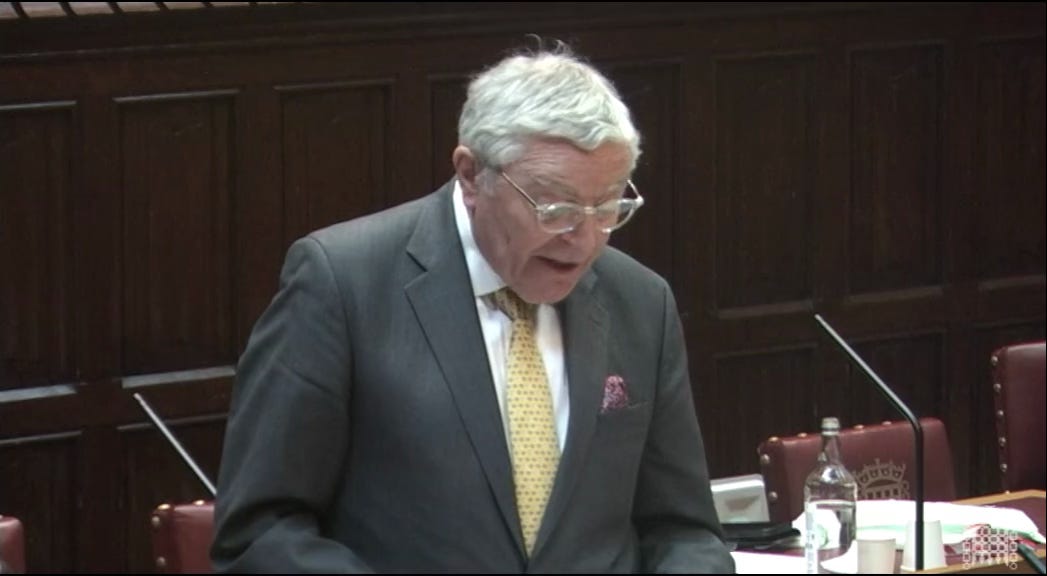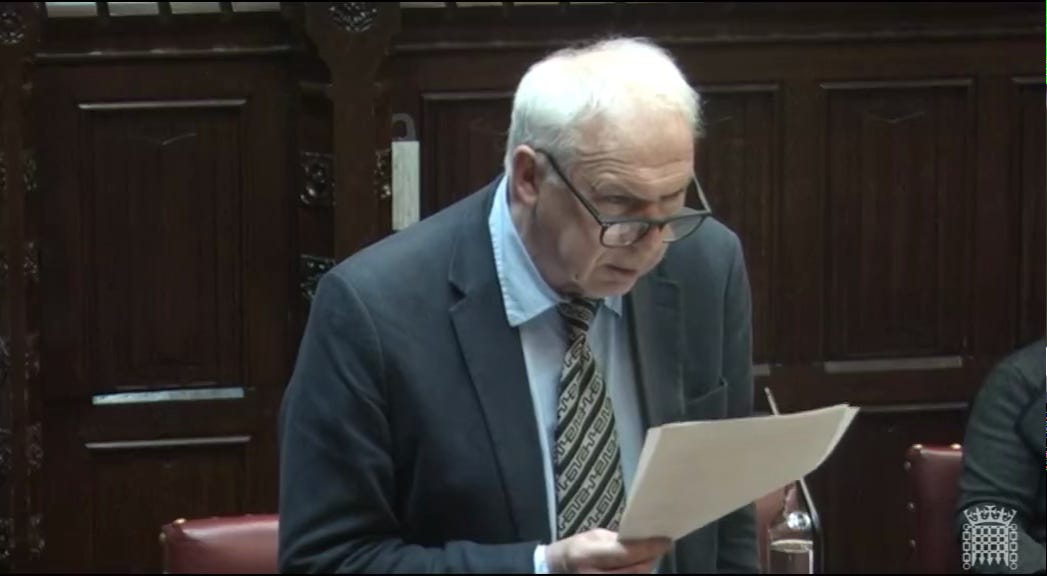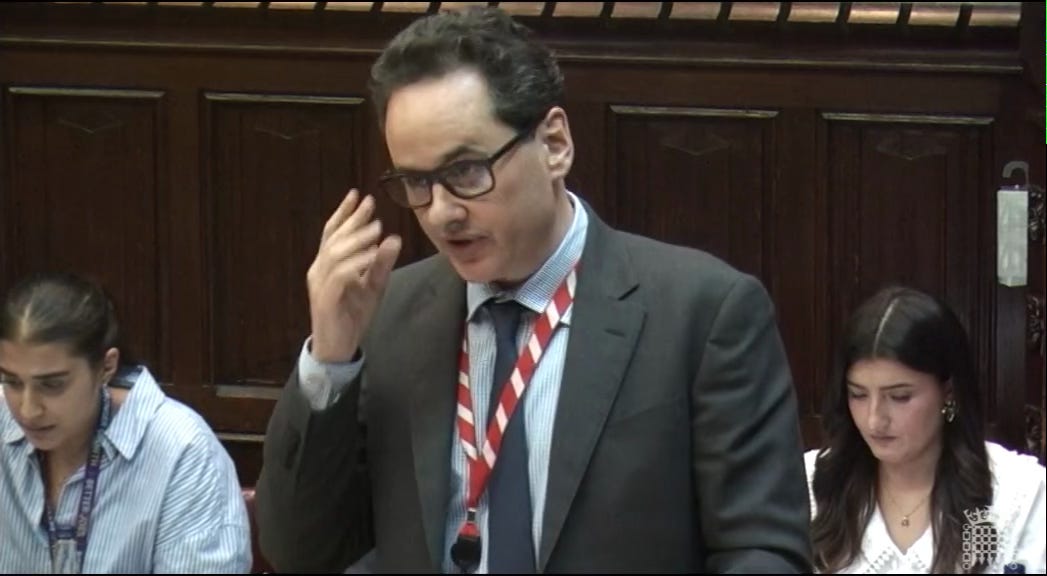I arguably memed the House of Lords into debating the Postcode Address File
The posting to debate-in-the-Lords pipeline
Quick programming note: I’m sorry that I still haven’t finished this week’s big essay due to, well, see below. So I’m afraid I’ll instead be posting it next week. But – hopefully you’ll get two big essay posts next week. I’ve got a super spicy media take cooking, as well as something about an exciting digital innovation that could unstick a very tricky policy area. So subscribe now (for free) to receive both!
Yesterday was a big day for democracy.
In the House of Lords, the Grand Committee met to debate the proposed amendments to the Data Protection and Digital Information (DPDI) Bill.
It’s an important and controversial bill that, if passed, will change how the law applies to data. For example, it will cause UK law to diverge from the EU’s GDPR regime in some respects, and it will also change the rules for how Subject Access Requests are handled – making them easier for organisations to reject if they believe the request is vexatious1.
But sadly one thing we now know that it probably won’t do is liberate the Postcode Address File (PAF).
Yes, dear readers, I’m afraid it is one of these posts again.
As Odds and Ends of History regulars will know, the PAF has become something of an obsession of mine (here’s some context on wtf it is for new readers), and I’ve accidentally crossed over into basically working as a campaigner for the cause.
So in between blasting out the hot takes on here, I’ve been working with Peter Wells, Anna Powell-Smith and Hadley Beeman, who are all actual technical and policy experts, to try and nudge the government into releasing the address database as open data. Because we believe that if developers can play with address data for free, it will lead to economic growth and innovation.
This ‘campaign’ – because I guess that’s what it is now – has made enough noise that we’ve even met with Jonathan Reynolds, Labour’s Shadow Business Secretary, who let us make the case directly to him after he saw my posts about it.
And more recently, we managed to persuade Tim Clement-Jones, the Liberal Democrats Science, Innovation and Technology spokesperson in the Lords, to put forward an amendment to the DPID Bill that could actually make it happen.
To be absolutely clear, despite my grabby-yet-self-aggrandising headline above, I can’t take credit for this: The amendment and all of the actual work is entirely down to Peter, Anna and Hadley, not to mention Tim and the other Peers who supported it. And of course, it stands on the shoulders of a generation of nerds who since 2009 have been pushing for it.
But if I can take a little credit for anything, I like to think my banging on about it has at least managed to reheat the PAF as an issue2 in ‘the discourse’, and caused some helpful people to pay attention – which in a very indirect way led to the amendment being proposed.
Anyway, that’s enough backstory. I know what you’re thinking: How did the actual debate turn out? Is the PAF going to be free?!
The Lords PAF Debate - all the key points
Here’s a video I made of all of the key speeches. I even added some slightly ropey AI subtitles.
The opening salvo
So to situate us, the Bill is currently at Committee stage in the Lords. It’s already been through the Commons – and now Peers have multiple chances to amend it. And this is the bit where they appear to get into the details, with a small group of Peers literally going through the text and suggesting adding words and removing commas, as well as pitching other amendments.
And after going through approximately ten trillion other amendments in two previous sessions, yesterday was our moment in the spotlight.
The debate began with Lord Clement-Jones officially introducing the PAF amendment, and he did a great job of setting out what was at stake, and making the case for why the current status-quo isn’t working.
Here’s what he said (emphasis mine throughout this piece)3:
Addresses are no longer just about sending letters; they are crucial spatial data infrastructure used by tens of thousands of UK businesses.
Reliable address data is important for navigation software, like TomTom Always, and successful service provision, like Amazon Deliveries.
Control of the UK's addresses was sold to Royal Mail when it was privatised in 2013, and there is now a complex system for generating and managing UK addresses, where most of the work is done by local authorities, but most of the benefits flow to Royal Mail.
If you are in the public sector, you can access address data for free, because the Government pays Royal Mail and Ordnance Survey millions of pounds per year for public sector access, but if you are a business, you have to pay for access, sign licensing agreements and potentially hire lawyers.
This is especially burdensome for start-ups and SMEs.
The previous Government created a Geospatial Commission to unlock the value of geospatial data, but it has not yet evaluated the arrangements with Royal Mail.
The process of creating and managing addresses is slow and complex, with multiple bodies involved.
This all causes a number of problems.
It holds back growth and innovation, it holds back emerging technology, it hinders public service delivery, it causes problems for citizens and, increasingly, it makes the UK an outlier amongst other high-income countries.
As a result, our address data is expensive, hard to access and unreliable.
All this means that the Government needs to act now to provide a dataset of all UK addresses that is accurate and can be freely used by anyone offering services to UK citizens.
Understanding our social world
Next up, one of our big name backers spoke in favour of the amendment, Former Green Party leader Baroness Natalie Bennett, who brilliantly signed on as an official backer of the amendment alongside Tom Watson and Francis Maude, started by, er, namedropping me4, Peter, Anna and Hadley. (Why yes, my ego is enormous now.)
More importantly though, she focused on how the freeing the PAF would create a level playing field for innovative small businesses so they can compete with giants like Amazon, to whom the fees are trivial.
And she also spoke about the role the PAF plays in civil society as a critical public dataset:
Now the noble Lord mentioned Amazon having to pay for the file.
I must admit I feel absolutely no sympathy there.
The great parasite, I'm no fan of it.
But it's an interesting contrast when we think of Amazon paying, but we also think of some new start-up, innovative company that wants to be able to access and reach people, deliver things to their home, and for them the cost of acquiring this file could be absolutely prohibitive and stop them actually getting started, stop them competing against Amazon.
And it's also something that I'm very interested in, the whole area of citizen science, and we're seeing huge developments of citizen science in areas that I often engage with, like birds and ecosystems, etc.
But there's also a chance for citizens who have access to the data to use it in all kinds of interesting ways to help us all collectively as a society understand the social world that we live in, understand what's happening with that social world.
This data is really crucial for people to be able to access that, and they absolutely should not have to pay to do that.
The shocking twist
Then came the biggest, most shocking twist in the debate. Baroness Dido Harding was in the room. She played an important role during the pandemic, running the Test & Trace programme – to which address data was obviously critical.
I wasn’t sure which way she’d go on the issue, so it was exciting when she delivered this short tour de force in support of the amendment:
One of the reasons that having this address data held by an independent private company is a problem is the quality of the data is not good enough as well.
And that's a real problem if you're trying to deliver a national service.
Whether that's in the public sector or the private sector, if the data quality isn't good enough, actually that leaves us as a country substantially poorer.
This is a fundamental asset for the country and the fundamental building block of our geolocation data as the noble Lord Clement sets out.
And anybody who's tried to build a service that delivers things to human beings in the physical world knows that errors in the database can cause really huge problems.
That might not feel like a huge problem if it's your latest Amazon delivery, but if it's the urgent dispatch of an ambulance, it's life and death.
And so maintaining the accuracy of your data and holding it close as a national asset, I think is a hugely important point, which is why I'd like to lend my support to this amendment.
Labour’s hesitance
Then we came to Labour’s DSIT spokesperson in the Lords, Lord Steve Bassam.
Sadly, he was not entirely persuaded by the cause – but it was encouraging to hear that he and his Shadow Cabinet colleagues have an “open mind” on the issue.
We have an open mind on this because there is a bit of a balance to be struck, I think, between privacy issues, but then the need to ensure that service delivery and commercial activity operate on a level playing field.
So I listened to the noble Lord Clement-Jones' passionate argument and I thought Baroness Harding made some powerful points on this.
But I'd like quite obviously to listen to what the Minister's got to say on this because we need to get this right as well.
And I think we can't have a situation where one part of the public service is holding up or getting it wrong so far as public service delivery is concerned and the operation of delivery services, physical delivery services, to our homes and households.
Interestingly, on his specific concern about privacy, I’m delighted to say that he’s slightly mistaken, as there are no privacy real issues with the PAF.
The database itself just contains the physical addresses of every building in the country – not the names of who lives there, and so on. It’d be like having a list of every phone number in the country with no names attached – you’d just have a big list of meaningless numbers, and they would be functionally useless unless you attach it to another dataset.
And in any case, as things stand the PAF is currently commercially available to anyone who wants to pay Royal Mail for it. So it isn’t like freeing the PAF would expose private address information into the public domain. As Natalie described, freeing the PAF would instead make it fair so that anyone can access it and build cool things on top of it.
The Ministerial smackdown
And then came the time for Viscount Jonathan Camrose, the government’s DSIT spokesman in the Lords, to respond to the proposed amendment. Unfortunately, it wasn’t good news.
He told the Peers present that:
High quality authoritative address data for the UK is used currently by over 50,000 public and private sector organisations, which I think demonstrates that current licensing arrangements are not prohibitive.
And then went on to claim that:
There is also free access to this data for developers to innovate in the market.
The government also makes this data available for free at the point of use to over 6,000 public sector organisations, as well as postcode, unique identifier and location data available under open terms.
The government has explored opening address data previously in 2016.
It became clear at that time that government would have to pay to make this data available openly or recreate it.
This was previously attempted and the resulting data set had, I'm afraid, critical quality issues.
As such, it was determined at that time that the changes would result in significant additional cost to taxpayers and represent low value for money given the current widespread accessibility of the data.
Unsurprisingly, I found this response incredibly disappointing. Not just because the government was opposing the amendment – that was to basically be expected. But the underlying argument he is making is… not a good one.
For example, the fact that thousands of businesses currently pay to licence the PAF does not mean that it isn’t a massive tax on innovation. Those businesses could be deploying their capital elsewhere, on productivity improving activities (and thus boosting our collective economic growth) instead of paying it to a rent-seeking licensing arrangement.
Similarly, what we don’t know is how many more innovative ideas are being strangled at birth by the fees, which are definitely not affordable.
As I’ve point out before, if you want to licence address data to update rows on a single spreadsheet on one computer, perhaps it doesn’t cost much money. But if you want to build an app or website – or do something clever with address data, even if you can develop your idea using address data for free… the moment you launch is the moment you need to spend upwards of £6000 every year, just for the PAF license.
And I’m not sure that most bedroom coders have a spare £6000 to gamble on their cool idea.
In any case however, the second part of his argument is just bizarre. What he’s alluding to when he describes how the government has tried other options, is an attempt several years ago by government to essentially build a new address dataset.
The idea was that if the government could build one without using PAF data, they could avoid paying the fees. But unfortunately, it didn’t work because of “critical quality issues”.
So in other words, the purported replacement didn’t work. And yet somehow this is supposed to be an argument against opening up the PAF?
We’ll be back
Finally, the debate went back to Tim Clement-Jones to respond to the Minster and give him the last word on the matter. And sadly, yes, he did then withdraw the amendment from consideration5.
However, he did express disappointment at the government’s position – rightly pointing out how it is strange to want economic growth and innovation while not taking the steps to actually support it.
It is rather disappointing to hear what the Minister had to say, given that they extolled the virtues of data and growth being linked.
This is a very clear example of where growth and business are being held back.
It sounds as though the Government do not want to take on the cost of making sure this data is freely available.
That could be the bottom line.
I am sure they will keep up the pressure for a solution to be found in this area, and I very much hope they will do that.
So though we weren’t successful this time, THE PAF FIGHT GOES ON!
According to Natalie, there’s a chance the amendment could come back in the Report stage of the bill – that’s what happens next. But to get anywhere further, it would definitely need Labour’s support.
So here I think there’s an enormous opportunity for Labour.
Whether they back an amendment at Report stage, or commit to it for after the election, liberating the PAF would be a fantastic low-hanging fruit for the party to grab to show its commitment to growth and innovation, and as a sign of support for small business.
However, in the short to medium term I guess the bad news for everyone reading is that, unfortunately, this still isn’t the end of the damn postcode thing. I’m going to still be banging on about it for some time yet.
So why not subscribe to stay up-to-date with what some people (me) are saying is perhaps the most important Parliamentary cause since the Great Reform Act.
And even if you're sick of the postcodes, subscribe anyway (for free!) as sometimes I write about other, more fun things too.
This seems bad in its own right!
There’s a fine line between “issue” and “running joke” and I’m attempting to figure out where exactly it is.
Note: I’ve used an AI tool for these transcripts and though I’m pretty confident they are accurate, as the tool is eerily excellent, I’m sure there’s a few words it has got wrong that I haven’t spotted.
I’m genuinely a little thrilled that I got a mention in Hansard. In centuries time, when historians – or AI bots working as historians – are scouring the archives, there’s a chance my name might make it into their LLM!
I don’t really understand Lords procedure, but I think that’s basically what happens unless there’s a Peer who really wants to pick a fight.









Hi James,
I’m a big email MP geek but this all feels a bit big and I’d be worried that I wouldn’t make the key points very well- if you were to make a template for followers to tweak/personalise and send I’d happily email Sir Keir and my local MP.
“ it stands on the shoulders of a generation of nerds who since 2009 have been pushing for it.”
Ahem, March 2006 if not earlier: that’s when “Give us back our Crown Jewels” was published in Guardian Technology.